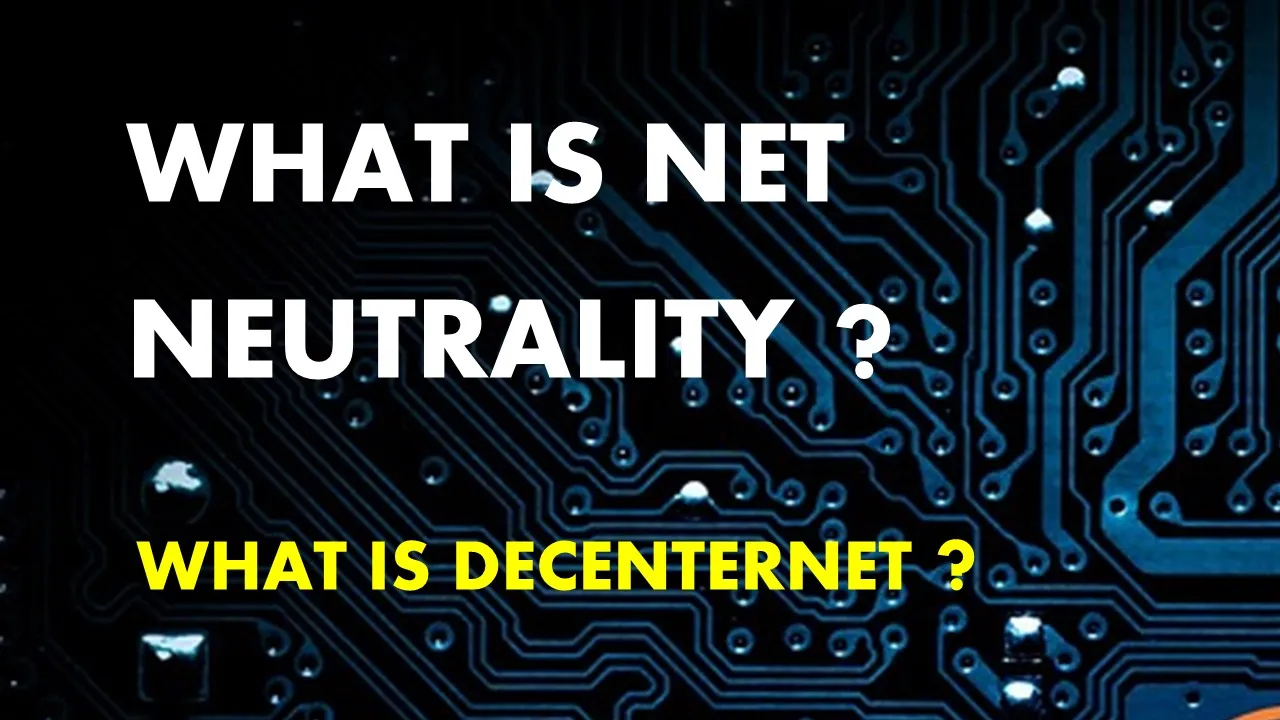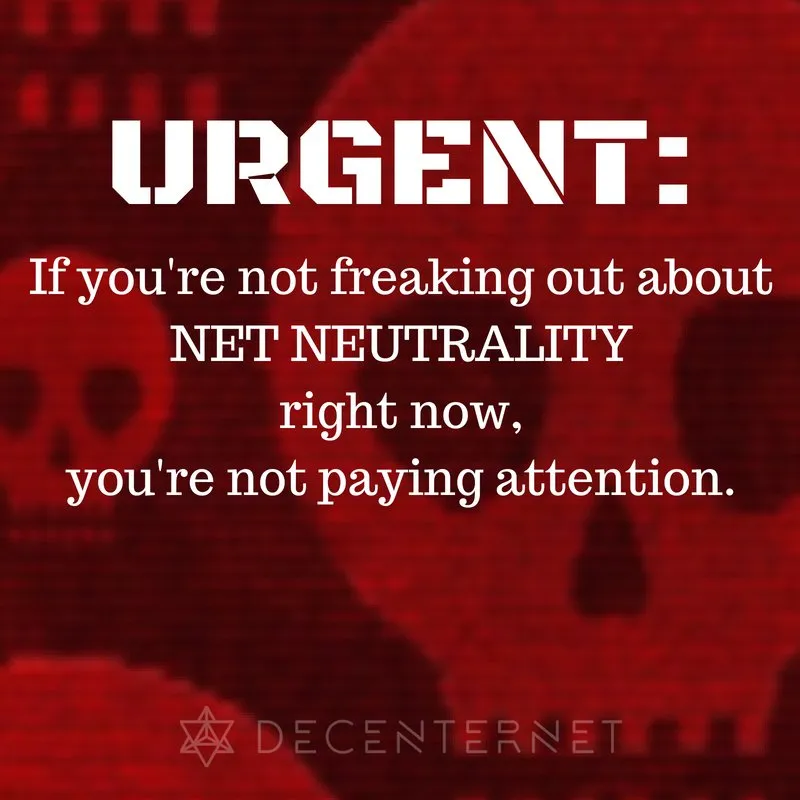
What is Net Neutrality?
Net Neutrality is the fundamental principle that Internet Service Providers (ISPs) treat all data on the Internet equally. This means that there can be no attempt by the ISPs to slow down (“throttle”) the speed of access by discriminating against the websites, platforms, authors, users, content or the medium of content.
Net neutrality is hugely topical at the minute as it is considered under threat from government reform and corporate influence in the US.
Later in this article is the news of the launch of a peer to peer Blockchain Internet, called Decenternet, as a possible solution to part of the global problem.

{Image Source: https://twitter.com/dnet_official}
Discrimination on internet access can be manifest in various forms including: discrimination on preferential access, access based on charging for premium speed, censorship, website blocking and intentionally slowing down traffic.
Perhaps the best example of discrimination was the giant American telecommunications company, Comcast, who were found to have been blocking the ability for subscribers to upload files using the peer to peer sharing platform BitTorrent in 2008.
The Open Internet
Net Neutrality is an intrinsic part of the Open Internet philosophy where the full resources of the internet should be available to all users equally. The Open Internet philosophy is borne out of the utopian Californian computer ideologies from the 1970s and the Cypherpunk movement and now encompasses various facets including; decentralised networks, open source software, absence of censorship, transparency, open web standards and liberation from all forms of political and corporation control.
The Closed Internet
In stark contrast, a Closed Internet has features of internet censorship (through law enforcement in some countries), violation of the end-to-end principle, artificially slow connection speeds on selected websites, and other restrictions imposed by influential corporations or governments.
The Current Status in the US
The issues of Net Neutrality and “Open Internet” appear to vary dramatically from country to country.
It is also a huge issue in India, this week, where the latest news is that the 500 million plus population has the benefit of legislation supporting net neutrality for the first time and you can read more about this from the BBC here.
However, it is perhaps at the height of debate in the US at present following a June 2018 decision to repeal some of the FCC (Federal Communications Commission) Net Neutrality rules, most of which had been created under Obama in 2011 as a policy to preserve a free and open internet.
At the heart of the current debate in the US is the Trump Administrations repeal of Net Neutrality rules including a change in what is known as “Title II”.
Prior to 2015 the ISPs had been classified as “Title 1: Information Service” of the Communications Act 1934 and ISPs “voluntarily” abided by the principles of Net Neutrality.
In 2015 the Open Internet Order reclassified broadband providers under “Title II: Common Carriers” – meaning that the FCC could actually enforce Net Neutrality.
This put all internet content onto the same level footing, for example it meant that Netflix couldn’t get an advantage over any other streaming service by paying ISPs to stream their services at a super-fast rate. In essence with broadband providers classified as common carriers under Title II, the FCC had the legal authority to enforce net neutrality rules against blocking, throttling, and premium paid priority access.
On 11 June 2018 the classification was changed back so that ISPs were less regulated: here is an opinion expressed by the Information Technology and Innovation Foundation (ITIF):
As the FCC’s “Restoring Internet Freedom Order” takes effect today, eliminating the heavy-handed 2016 Title II net neutrality rules, the Information Technology and Innovation Foundation (ITIF), …… issued the followed statement …….:
The Obama Administration’s net neutrality rules, grounded in Title II of the Communications Act, put the United States on the path of regulating broadband like an unchanging public utility. It is time to put the Title II chapter in the net neutrality saga behind us.
[FCC] Chairman Pai’s efforts return broadband to a regulatory environment better suited to encouraging an innovative, evolving communications platform. The Chicken Littles claiming “the end of the Internet” will now be proved wrong.
However, there is still much to be done to achieve a stable, lasting legal framework that gives everyone in the Internet ecosystem confidence to invest in and use this crucial technology. Now is the time for policymakers to work toward bipartisan compromise legislation that will stand the test of time.
Source
Both sides of the debate have well known supporters:
Against rigid Net Neutrality:
The Trump administrations’ appointed FCC Commissioner, Ajit Pai, has stated that commonly perceived threats from Internet Service Providers to deceive internet users by degrading or discriminating content are non-existent:
" The evidence of these continuing threats? There is none; it’s all anecdote, hypothesis, and hysteria. A small ISP in North Carolina allegedly blocked VoIP calls a decade ago. Comcast capped BitTorrent traffic to ease upload congestion eight years ago. Apple introduced Facetime over Wi-Fi first, cellular networks later. Examples this picayune and stale aren’t enough to tell a coherent story about net neutrality. The bogeyman never had it so easy.
So what is there to fear? A sober reader might borrow from the father of Title II: “The only thing we have to fear is fear itself.” But the FCC instead intones the nine scariest words for any friend of Internet freedom: “I’m from the government, and I’m here to help.”
To put it another way, Title II is not just a solution in search of a problem—it’s a government solution that creates a real-world problem. This is not what the Internet needs, and it’s not what the American people want.”
Source FCC: Here
Advocates for Net Neutrality:
There are many famous advocates for Net Neutrality including Apple co-founder Steve Wozniak, Barack Obama and founder of the Web, Tim Berners-Lee.
Collectively supporters for Net Neutrality, including several of the world’s most popular websites (Amazon, Google, Reddit and Netflix), gathered behind the largest online protest in history on 12 July 2017 to object to the US government plans to relax Net Neutrality rules.
Perhaps the most pertinent quote in support of Net Neutrality comes in a joint open letter to the FCC from an impressive list of Internet Pioneers including Tim Berners-Lee and Vinton G. Cerf:
“We are the pioneers and technologists who created and now operate the Internet, and some of the innovators and business people who, like many others, depend on it for our livelihood. We are writing to respectfully urge you to call on FCC Chairman Ajit Pai to cancel the December 14 vote on the FCC’s proposed Restoring Internet Freedom Order….
This proposed Order would repeal key network neutrality protections that prevent Internet access providers from blocking content, websites and applications, slowing or speeding up services or classes of service, and charging online services for access or fast lanes to Internet access providers’ customers.
The proposed Order would also repeal oversight over other unreasonable discrimination and unreasonable practices, and over interconnection with last-mile Internet access providers.
The proposed Order removes long-standing FCC oversight over Internet access providers without an adequate replacement to protect consumers, free markets and online innovation.
Source: Here
Is there an Alternative Solution? Soon there will be:
Whilst researching Net Neutrality, internet philosophy, blockchain technology you might come across the website Decenternet also known as D-net which is an entirely ground-breaking alternative P2P neutral decentralized internet platform. The proposed solution, proliferates net neutrality, protects privacy and removes the influence of potentially biased corporations or centralised organisations.

How does Decenternet work?
Decenternet is a decentralised network which is to be built on the latest blockchain technology, and brings with it some interesting features including:
- Fast and secure browsing through the “Anuvys” Operating System. Anuvys is the free native default Operating System, which is Linux based and is derived from Open Source software. It is completely in alignment with the Cypherpunk philosophy about how the Internet experience was supposed to be.
- A Liberty Search Engine/ Osiris Web Browser created as a completely free web environment which delivers profits directly to the participating peers without the interference of an intermediary.
- A highly incentivised Spyce cryptocurrency which is the foundation of all trade and commerce on the d-net and is available to anyone meaning that both content producers and content consumers are rewarded. The node providers for the P2P internet will be rewarded with Spyce.
All of the above features are included in much more detail on the White Paper of this new project: further information: https://decenternet.com/ and ANUVYS website: https://anuvys.com/.
Decenternet has a presence on Social Media on:
Facebook: https://www.facebook.com/Decenternet200962407141047/
Twitter: https://twitter.com/dnet_official
Decenternet Telegram Group: https://t.me/dnetofficial
Decenternet is vocal about securing net neutrality on social media, they have an ambition to help solve threats to Net Neutrality and Data Privacy:
Decenternet…… provides users with boundless access to different websites without interfering with the connection and internet traffic. It also treats all contents equally without any preferences.
There is much debate to be had! Let me know your thoughts?
DISCLAMER:
The information contained within this post shall not be taken as a financial advice. I am not a financial advisor and none of your investment decisions should be carried out based on any information presented here. You can lose all of your money by investing. The information presented in this article is for educational and entertainment purposes only.